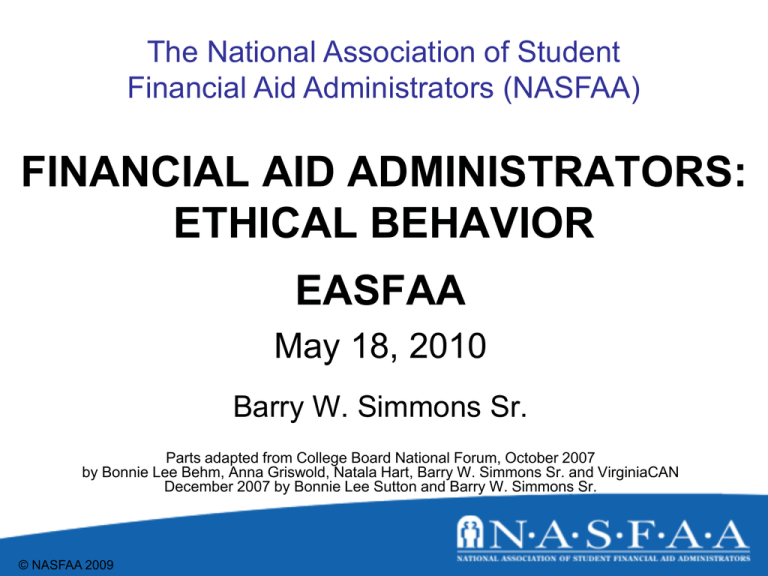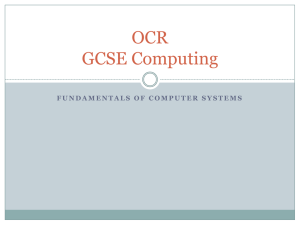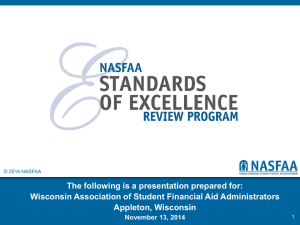
The National Association of Student
Financial Aid Administrators (NASFAA)
FINANCIAL AID ADMINISTRATORS:
ETHICAL BEHAVIOR
EASFAA
May 18, 2010
Barry W. Simmons Sr.
Parts adapted from College Board National Forum, October 2007
by Bonnie Lee Behm, Anna Griswold, Natala Hart, Barry W. Simmons Sr. and VirginiaCAN
December 2007 by Bonnie Lee Sutton and Barry W. Simmons Sr.
© NASFAA 2009
FAA ETHICAL BEHAVIOR
Ethics (via Latin ethica from the Ancient Greek
ἠθική [φιλοσοφία] "moral philosophy", from the
adjective of ἤθος ēthos "custom, habit"), a major
branch of philosophy, is the study of values and
customs of a person or group. It covers the
analysis and employment of concepts such as
right and wrong, good and evil, and
responsibility. It is divided into three primary
areas: meta-ethics (the study of the concept of
ethics), normative ethics (the study of how to
determine ethical values), and applied ethics (the
study of the use of ethical values).
(Wikipedia)
© NASFAA 2008
FAA ETHICAL BEHAVIOR
ROADMAP
Glass is Half Empty/Full? For Whom?
Formal Framework
Obvious or Subtle
Philosophical Underpinnings
NASFAA Ethical Principles / Code of Conduct
Discussion
© NASFAA 2008
FAA ETHICAL BEHAVIOR
Framework
Deliberation, Discussion, Circumstances
Situational
Awareness---Intention and Motivation
Don’t Know that Don’t Know
Know that Know
Decisions’ Consequences
For Whom?
© NASFAA 2008
FAA ETHICAL BEHAVIOR
“Students don’t fail…teachers fail.”
(Define FAIL)
When students and their families have
financial aid difficulties,
who’s driving the failure?
© NASFAA 2008
FAA ETHICAL BEHAVIOR
The Simmons Aid Administrator
Facilitator-Steward Continuum
© NASFAA 2008
FAA ETHICAL BEHAVIOR
I know no possible way of teaching how to
think by the use of formulas or by concise
and abrupt shortcuts. I am convinced that
anyone who pretends to make this possible
is devoid of thought, and is committed to a
peculiar doctrine that makes thinking
unnecessary.
(Belth, 1977, p.xx)
© NASFAA 2008
FAA ETHICAL BEHAVIOR
Hobbes - Social Contract Theory
views the natural state of things as an
ongoing desire and struggle for power and
status…influence (shared values)
…control. This ‘natural state of things’
amounts to chaos where all are equal,
physically and mentally.
© NASFAA 2008
FAA ETHICAL BEHAVIOR
Hobbes, continued
But humans are also rational, sometimes
logical, and thus will more than likely create
a ‘social contract’ (ETHICS) that takes the
brutal edge off of the ‘natural state of
things.’
© NASFAA 2008
FAA ETHICAL BEHAVIOR
Ethics are ground rules for seeking
influence
Ethics are the glue for achieving
personal efficacy
Ethics are control mechanisms
© NASFAA 2008
FAA ETHICAL BEHAVIOR
Jeremy Bentham - Utilitarianism
The greatest good for the greatest number
Martin Buber - Existentialism
I and Thou Experience and Relationship
Inanimate and Animate
Bottom Line - ”The Golden Rule”
Are Ethics Situational?
© NASFAA 2008
FAA ETHICAL BEHAVIOR
©1999 Universal Press Syndicate.
© NASFAA 2008
FAA ETHICAL BEHAVIOR
Define “good”!?
© NASFAA 2008
FAA ETHICAL BEHAVIOR
©1999 Universal Press Syndicate.
© NASFAA 2008
FAA ETHICAL BEHAVIOR
“Transparency is a very trendy word right now
but has always been value added both
internally and externally ….. Why? Because
by letting your staff, your board and your
community know what you are doing, you
reduce if not remove suspicion, increase trust
and increase public input.”
Light Pathways to Nonprofit Excellence
© NASFAA 2008
FAA ETHICAL BEHAVIOR
NASFAA Statement of Ethical Principles
• Be aware of student issues and advocate for them
• Promote early awareness
• Educate students and families through quality
consumer information.
• Respect the dignity and protect the privacy of
students, and ensure confidentiality
• Treat students in a consistent manner
• Provide services without discrimination
© NASFAA 2008
FAA ETHICAL BEHAVIOR
NASFAA Statement of Ethical Principles
cont
• Recognize the need for professional development
• Foster respect for diverse viewpoints within the
profession.
• Refrain from conflict of interest or the perception
thereof.
• Maintain the highest level of professionalism,
reflecting a commitment to the goals of the National
Association of Student Financial Aid Administrators
© NASFAA 2008
FAA ETHICAL BEHAVIOR
NASFAA Code of Conduct
(2007)
• Refrain from taking any action for personal benefit.
• Refrain from taking any illegal or irresponsible
action
• Refrain from providing information with a bias for
personal gain
• Refrain from soliciting or accepting anything of other
than nominal value
• Disclose any involvement with or interest in any
entity involved in any aspect of student financial aid
© NASFAA 2008
FAA ETHICAL BEHAVIOR
Steps to Consider
• Be Transparent
• Develop a Culture of Accountability and Transparency
• Adopt a Statement of Values and Code of Ethics
• Adopt a Conflict of Interest Policy
• Conduct Independent Financial Reviews
• Establish and Support a Whistleblower Policy
• Remain Current with the Law
© NASFAA 2008
FAA ETHICAL BEHAVIOR
What are the ethical dimensions of:
• Pursuing rigorous optional verification efforts to
identify isolated anecdotal eligibility issues that
have no statistical significance?
• Need blind vs. need aware admissions?
• Encouraging a student to attend your institution
at great loan expense when you know they have
better financial options at other institutions?
© NASFAA 2008
FAA ETHICAL BEHAVIOR
What are the ethical dimensions of:
• Encouraging borrowing from for-profit and
quasi for-profit organizations rather than from
non-profit organizations?
• Imposing limitations on the use of professional
judgment because of audit fears/concerns?
• Imposing limitations on the use of professional
judgment because of funding concerns?
•
© NASFAA 2008
FAA ETHICAL BEHAVIOR
What are the ethical dimensions of:
• Establishing an unrealistically low cost of
attendance so you can tout you meet 100% or
a high percentage of need?
• Offering freshmen recruiting scholarships for
the freshman year only while students and
their families are being asked for a four-year
commitment?
• Pursuing optional verification efforts when the
final outcome won’t change student eligibility?
© NASFAA 2008
FAA ETHICAL BEHAVIOR
What are the ethical dimensions of:
• Targeting aid programs?
• Monitoring departmental awarding of need
based named scholarships to students with
no need?
• Counseling a student without listening to
what the student has to say?
© NASFAA 2008
FAA ETHICAL BEHAVIOR
What are the ethical dimensions of:
• Counseling a student without searching for
options?
• Assuming low-income families are truly
economically prepared, even if need is
met?
• Encouraging uncertified loan products?
© NASFAA 2008
FAA ETHICAL BEHAVIOR
What are the ethical dimensions of:
Offering no need based aid – funding merit
only?
Granting independent status based on
pressure from colleagues/supervisors?
Others?
© NASFAA 2008
FAA ETHICAL BEHAVIOR
Are there Ethical Absolutes?
Are you a Gate Keeper or a Gate Opener?
Dr. Barry W. Simmons Sr, Director, Va Tech USFA. simmonsb@vt.edu
www.finaid.vt.edu/presentations/
© NASFAA 2008
FAA ETHICAL BEHAVIOR
Suggested Reading
•
•
•
•
•
•
•
•
•
•
•
•
•
Alliance for Nonprofit Management www.allianceonline.org
Belth, Marc (1977). The process of thinking. New York : McKay.
Buber, Martin (1958). I and thou. (Ronald Gregor Smith, Trans.) New York : C. Scribner's
Sons.
Independent Sector www.IndependentSector.org
Internet Encyclopedia of Philosophy. Social contract theory. Retrieved from
http://www.iep.utm.edu/s/soc-cont.htm.
McPherson, Michael S. & Shapiro, Morton Owen (1998). The student aid game - meeting
need and rewarding talent in american higher education, Princeton University Press, pp.
100-103.
Nonprofit Financial Center www.nfconline.org
Missner, Marshall (Ed.) (2008).Thomas hobbes : leviathan. New York : Pearson Longman.
Rachels, James (1999). The elements of moral philosophy. McGraw Hill (paperback).
Shafer-Landau, Russ (2004). Whatever happened to good and evil? Oxford University
Press.
Virginia Business Information Center www.dba.virginia.gov
Virginia Network of Nonprofit Organizations (VANNO) www.VANNO.org
War, Mary (Ed.) (2003). Utilitarianism ; and, on liberty : including mill's ‘essay on bentham'
and selections from the writings of jeremy bentham and john austin. Malden, MA :
Blackwell Pub.
© NASFAA 2008
© NASFAA 2008









